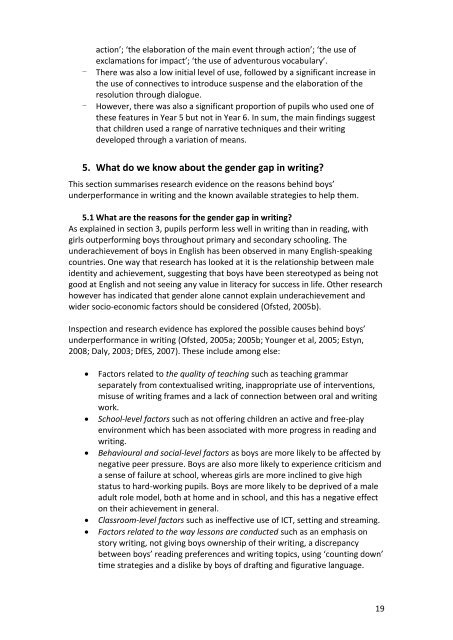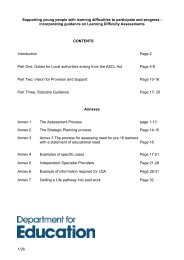What is the research evidence on writing? - Department for Education
What is the research evidence on writing? - Department for Education
What is the research evidence on writing? - Department for Education
Create successful ePaper yourself
Turn your PDF publications into a flip-book with our unique Google optimized e-Paper software.
acti<strong>on</strong>’; ‘<str<strong>on</strong>g>the</str<strong>on</strong>g> elaborati<strong>on</strong> of <str<strong>on</strong>g>the</str<strong>on</strong>g> main event through acti<strong>on</strong>’; ‘<str<strong>on</strong>g>the</str<strong>on</strong>g> use of<br />
exclamati<strong>on</strong>s <strong>for</strong> impact’; ‘<str<strong>on</strong>g>the</str<strong>on</strong>g> use of adventurous vocabulary’.<br />
- There was also a low initial level of use, followed by a significant increase in<br />
<str<strong>on</strong>g>the</str<strong>on</strong>g> use of c<strong>on</strong>nectives to introduce suspense and <str<strong>on</strong>g>the</str<strong>on</strong>g> elaborati<strong>on</strong> of <str<strong>on</strong>g>the</str<strong>on</strong>g><br />
resoluti<strong>on</strong> through dialogue.<br />
- However, <str<strong>on</strong>g>the</str<strong>on</strong>g>re was also a significant proporti<strong>on</strong> of pupils who used <strong>on</strong>e of<br />
<str<strong>on</strong>g>the</str<strong>on</strong>g>se features in Year 5 but not in Year 6. In sum, <str<strong>on</strong>g>the</str<strong>on</strong>g> main findings suggest<br />
that children used a range of narrative techniques and <str<strong>on</strong>g>the</str<strong>on</strong>g>ir <strong>writing</strong><br />
developed through a variati<strong>on</strong> of means.<br />
5. <str<strong>on</strong>g>What</str<strong>on</strong>g> do we know about <str<strong>on</strong>g>the</str<strong>on</strong>g> gender gap in <strong>writing</strong>?<br />
Th<str<strong>on</strong>g>is</str<strong>on</strong>g> secti<strong>on</strong> summar<str<strong>on</strong>g>is</str<strong>on</strong>g>es <str<strong>on</strong>g>research</str<strong>on</strong>g> <str<strong>on</strong>g>evidence</str<strong>on</strong>g> <strong>on</strong> <str<strong>on</strong>g>the</str<strong>on</strong>g> reas<strong>on</strong>s behind boys’<br />
underper<strong>for</strong>mance in <strong>writing</strong> and <str<strong>on</strong>g>the</str<strong>on</strong>g> known available strategies to help <str<strong>on</strong>g>the</str<strong>on</strong>g>m.<br />
5.1 <str<strong>on</strong>g>What</str<strong>on</strong>g> are <str<strong>on</strong>g>the</str<strong>on</strong>g> reas<strong>on</strong>s <strong>for</strong> <str<strong>on</strong>g>the</str<strong>on</strong>g> gender gap in <strong>writing</strong>?<br />
As explained in secti<strong>on</strong> 3, pupils per<strong>for</strong>m less well in <strong>writing</strong> than in reading, with<br />
girls outper<strong>for</strong>ming boys throughout primary and sec<strong>on</strong>dary schooling. The<br />
underachievement of boys in Engl<str<strong>on</strong>g>is</str<strong>on</strong>g>h has been observed in many Engl<str<strong>on</strong>g>is</str<strong>on</strong>g>h-speaking<br />
countries. One way that <str<strong>on</strong>g>research</str<strong>on</strong>g> has looked at it <str<strong>on</strong>g>is</str<strong>on</strong>g> <str<strong>on</strong>g>the</str<strong>on</strong>g> relati<strong>on</strong>ship between male<br />
identity and achievement, suggesting that boys have been stereotyped as being not<br />
good at Engl<str<strong>on</strong>g>is</str<strong>on</strong>g>h and not seeing any value in literacy <strong>for</strong> success in life. O<str<strong>on</strong>g>the</str<strong>on</strong>g>r <str<strong>on</strong>g>research</str<strong>on</strong>g><br />
however has indicated that gender al<strong>on</strong>e cannot explain underachievement and<br />
wider socio-ec<strong>on</strong>omic factors should be c<strong>on</strong>sidered (Ofsted, 2005b).<br />
Inspecti<strong>on</strong> and <str<strong>on</strong>g>research</str<strong>on</strong>g> <str<strong>on</strong>g>evidence</str<strong>on</strong>g> has explored <str<strong>on</strong>g>the</str<strong>on</strong>g> possible causes behind boys’<br />
underper<strong>for</strong>mance in <strong>writing</strong> (Ofsted, 2005a; 2005b; Younger et al, 2005; Estyn,<br />
2008; Daly, 2003; DfES, 2007). These include am<strong>on</strong>g else:<br />
Factors related to <str<strong>on</strong>g>the</str<strong>on</strong>g> quality of teaching such as teaching grammar<br />
separately from c<strong>on</strong>textual<str<strong>on</strong>g>is</str<strong>on</strong>g>ed <strong>writing</strong>, inappropriate use of interventi<strong>on</strong>s,<br />
m<str<strong>on</strong>g>is</str<strong>on</strong>g>use of <strong>writing</strong> frames and a lack of c<strong>on</strong>necti<strong>on</strong> between oral and <strong>writing</strong><br />
work.<br />
School-level factors such as not offering children an active and free-play<br />
envir<strong>on</strong>ment which has been associated with more progress in reading and<br />
<strong>writing</strong>.<br />
Behavioural and social-level factors as boys are more likely to be affected by<br />
negative peer pressure. Boys are also more likely to experience critic<str<strong>on</strong>g>is</str<strong>on</strong>g>m and<br />
a sense of failure at school, whereas girls are more inclined to give high<br />
status to hard-working pupils. Boys are more likely to be deprived of a male<br />
adult role model, both at home and in school, and th<str<strong>on</strong>g>is</str<strong>on</strong>g> has a negative effect<br />
<strong>on</strong> <str<strong>on</strong>g>the</str<strong>on</strong>g>ir achievement in general.<br />
Classroom-level factors such as ineffective use of ICT, setting and streaming.<br />
Factors related to <str<strong>on</strong>g>the</str<strong>on</strong>g> way less<strong>on</strong>s are c<strong>on</strong>ducted such as an emphas<str<strong>on</strong>g>is</str<strong>on</strong>g> <strong>on</strong><br />
story <strong>writing</strong>, not giving boys ownership of <str<strong>on</strong>g>the</str<strong>on</strong>g>ir <strong>writing</strong>, a d<str<strong>on</strong>g>is</str<strong>on</strong>g>crepancy<br />
between boys’ reading preferences and <strong>writing</strong> topics, using ‘counting down’<br />
time strategies and a d<str<strong>on</strong>g>is</str<strong>on</strong>g>like by boys of drafting and figurative language.<br />
19
















